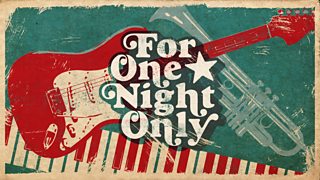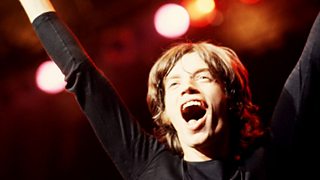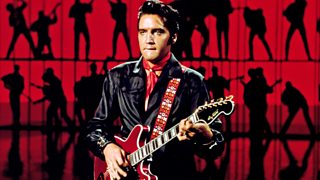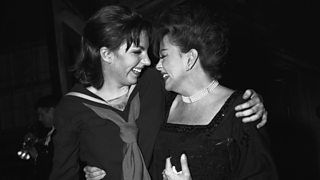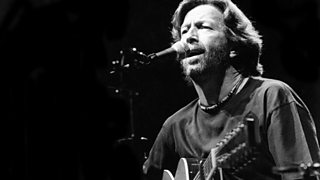Five of the most legendary live gigs ever
What was the best gig you ever went to? If you’re anything like us, the answer will instantly form on your lips because live music can have such a profound and unforgettable effect on our lives.
In For One Night Only, Paul Gambaccini revisits life-changing concerts from the worlds of rock, pop, classical, and even comedy, and discusses the impact they had on individuals and the wider cultural landscape. Here are just a few of the earth-shattering shows covered on the programme…
-
![]()
Why you should listen to For One Night Only
Paul Gambaccini lifts the lid on the award-winning radio series.
Bob Marley and the Wailers – Live at the Lyceum
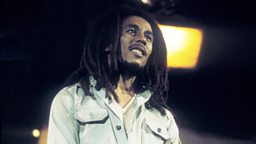
Now a global musical icon, with his poster adorning many a student dorm wall and his most popular songs practically ubiquitous, it’s hard to imagine a time when Bob Marley, and reggae music in general, was little known.
This all changed in 1975 when Marley, up until then a favourite of fringe music aficionados, crossed over into the mainstream, taking reggae, derided by many in the mainstream music press, with him. This was helped, in part, by his appearance at London’s Lyceum Theatre in July 1975 and the live album it spawned, which featured the remarkable, best-known version of No Woman, No Cry.
As well as bringing reggae to the world stage, this legendary show had a massive impact on many young, particularly black, Londoners that witnessed it. “It was like a ground zero going to that gig,” Don Letts told the programme. “The next day we were empowered. We’d seen Bob Marley.”
Listen to For One Night Only: Bob Marley and the Wailers - Live at the Lyceum
Elton John (and John Lennon) – Madison Square Garden
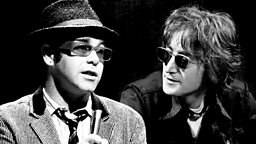
It all started with a bet. Elton John, who was of the biggest musical stars in the world in the mid-seventies, agreed to play and sing on John Lennon’s 1974 song Whatever Gets You Through The Night. In return, Elton wagered with Lennon that if the song got to number one, they would perform together.
The song did top the charts and Elton called in the bet on Thanksgiving Night 1974 at Madison Square Garden in New York. “There’s something about that venue. Magic happens in that place,” opening act on the evening Kiki Dee told Paul Gambaccini. And on that night, magic was certainly in the air. An astonishing explosion of noise met the appearance of Lennon on stage alongside Elton.
Geoff Maskell, a teenage fan of both Johns who was at the show said: “That incredible moment when John Lennon came out on stage, I don’t know how the roof of Madison Square Garden stayed intact.” No one knew at the time that this would be John Lennon’s last major live appearance.
Listen to For One Night Only: Elton John (and John Lennon) – Madison Square Garden
George Harrison – The Concert for Bangladesh

Madison Square Garden was the venue for another incredibly important and groundbreaking live concert involving a former Beatle. There have been so many charity records and concerts in recent years, including the massively successful Band Aid and Live Aid campaigns in the 1980s, that it’s difficult to recall a time when they didn’t exist. But 1971’s Concert for Bangladesh, organised by George Harrison, was the first major event of its kind.
Civil war in Pakistan and Bangladesh had led to a refugee and humanitarian crisis affecting millions of people. Urged by his friend Ravi Shankar, Harrison first released a single (Bangla Desh) and then organised a concert to raise funds and awareness. Thanks to the participation of Ringo Starr, Eric Clapton, Leon Russell and Bob Dylan, the single, concerts and subsequent live album were hugely successful in raising awareness and funds, while problems in the cash flow generated by the project informed later charity endeavours such as Live Aid.
Chip Lyons, President of the US Fund for UNICEF said of Harrison: “He used music, he used his friends, in the most positive sense. He brought them together to make a very dramatic change.”
Listen to For One Night Only: George Harrison - The Concert for Bangladesh 1971
Miles Davis and Quincy Jones - Live at Montreux
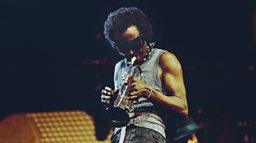
Miles Davis was a complicated and formidable musical icon. Constantly moving forward, he had a tendency to antagonise fans and collaborators by changing styles and approach in his attempts to diversify his sound. So when Quincy Jones suggested that Miles perform some of the music he’d created at the start of his career, in conjunction with arranger and producer Gil Evans, to celebrate the 25th anniversary of the Montreux Jazz Festival in 1991, few thought he stood a chance. But as Paul Gambaccini explains, “Quincy could be very persuasive”. “He was trying to squirm out of it,” Quincy Jones himself confirmed, “But he did it.”
For fans of the music of this era, it was a once in a lifetime opportunity. When this music was recorded in the ‘40s and ‘50s, there were no extended concert tours or showcase live events. And as Miles never looked back, hardly anyone had heard these legendary songs performed live.
Two orchestras, both conducted by Quincy, and a host of guest musicians including Grady Tate, Benny Bailey and Kenny Garrett contributed to the magical occasion. It turned out to be one of the last moments of magic from the jazz legend. Just three months after the concerts, in September 1991, Miles Davis died aged 65.
As Quincy Jones remembered: “You could see this courageous 65-year-old battling with his 25-year-old brilliance. But he had the same brilliance at 65. It was an amazing experience.”
Listen to For One Night Only: Miles Davis and Quincy Jones Live at Montreux
The Prom of Peace

Sometimes the forces of music and history clash in a most surprising way. On August 21, 1968, Russian forces entered Czechoslovakia crushing the ‘Prague Spring’ uprising. In an amazing coincidence, the Soviet State Symphony Orchestra made its first ever appearance at the 91�ȱ� Proms on that very same day. And not only that, but their set list included Czech composer Antonín Dvořák’s beloved Cello Concerto.
“It was so ironic,” recalled Julian Lloyd-Webber, just 16 when he attended the Prom. Many assumed that the concert would not go ahead. Protests were planned at the Soviet Embassy and at the Royal Albert Hall, where the event was taking place, one by activist and writer Tariq Ali who said, “It is an orchestra funded by the state and we have to show our anger.”
Despite all these misgivings, the concert went ahead, with some demonstrations and counter demonstrations taking place in the hall. The programme included the Dvořák Concerto, featuring soloist Mstislav Rostropovich. Perhaps buoyed by the emotion of the occasion, it is still considered one of the greatest ever live renditions of the piece.
Listen to For One Night Only: The Prom of Peace
For One Night Only
-
![]()
The Rolling Stones
Paul Gambaccini looks back to the Rolling Stones' Madison Square Garden concert in 1969.
-
![]()
Elvis Comes Back
An electrifying performance on NBC TV in December 1968 restored Elvis's reputation.
-
![]()
Judy and Liza at The Palladium
Paul Gambaccini recalls the first joint stage concert by Judy Garland and Liza Minnelli.
-
![]()
Clapton Unplugged
Eric Clapton tells Paul Gambaccini about the 1992 recording of his ground-breaking album.
